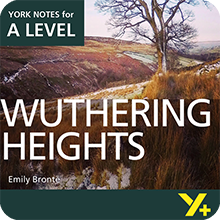Examiner's Notes
You assessed this answer as a Very High.
Hover over the highlighted text to read the examiner’s comments. These are linked to the Assessment Objectives, which are listed in the side panel.
It might seem strange that in a love story there would be so many ideas about conflict, but in ‘Wuthering Heights’ almost all the characters come into conflict with the ideas of the time, or with each other. For example, Catherine is much more free to roam the moors than Victorian women would normally be, and she is very wilful, even violent at times. Examples of this violence, such as when she asks for a whip, have led some feminist critics to say Catherine is quite masculine. While I don’t really agree with that view, I do think Catherine is unusually aggressive for a woman of her time, especially when she slaps and is physically violent to the other characters when she does not get her own way. She is a very fiery character, which contrasts with the characters in Elizabeth Jennings’s poem ‘One Flesh’ which is a very cold poem, though the couple are also in conflict. Interestingly the poem is entitled ‘One Flesh’ and that is exactly how Catherine describes her relationship with Heathcliff, though there is not much passion left between the two characters in Jennings’s poem. Also contrasting with ‘Wuthering Heights’, the characters in Jennings’s poem stay indoors, in bed, which is the direct opposite of Catherine until she is ill, which she becomes because of the conflict she feels in marrying Edgar and loving Heathcliff.
The central conflict in the novel is Catherine’s choice of who to marry. This was an important choice for Victorian women, because they were dependent on men for their survival. In Victorian times there was a great deal of inequality between men and women, and women didn’t have a lot of power. Brontë sets up the choice between Edgar and Heathcliff as though there wasn’t really a choice: knowing that financial security is of utmost importance Catherine tells Nelly ‘It would degrade me to marry Heathcliff.’ But then the plot unfolds to show that really the choice was the other way. It degrades Catherine to marry someone who is not her soul mate. In the end, she is so degraded that she dies and becomes a ghost.
Another love triangle which forms an area of conflict in the novel is when Isabella falls in love with the transformed Heathcliff. Catherine warns Isabella not to love Heathcliff, who she says is a ‘fierce, pitiless, wolfish man’, but Isabella suspects that this is because Catherine really loves him herself. However, Catherine knows Heathcliff’s true nature, which, dominated by his animal quality, is to destroy Isabella. As readers we believe Catherine, but we also know that Isabella has a valid point.
The love triangle is also a part of Anne Sexton’s poem ‘For My Lover, Returning to His Wife’ but in this poem the conflict is all internal. The poet gives her lover the permission to return to his wife, even though she wishes she could be more permanent herself. However, in ‘Wuthering Heights’, Heathcliff cannot give Catherine permission to stay with Edgar – he sees her marriage to Edgar as an act of violence towards himself. And Catherine blames both of them for ruining her. Again we see Catherine as quite a spoiled character, who blames her misfortunes on other people. It is because of this that Nelly Dean, the servant, has no patience with her and fails to see that she is really ill. Catherine’s poor behaviour misleads Nelly into thinking she is pretending and so contributes to her own death.
Another area of conflict in this novel is the conflict between religion and love. Brontë presents a version of traditional Christianity which is almost laughable in the character of Joseph. Joseph is rude and grudging. He is not nice to any of the other characters, and almost delights in their misfortunes. Against this, Brontë puts forward the idea of a more Romantic kind of love, the love between Catherine and Heathcliff, which she says is itself a kind of truth, and morally good. This can be seen also in Blake’s poetry. Blake did not like the dominant Christian views expressed by the Church during his lifetime. His poem ‘The Garden of Love’ mentions a garden full of graves, all thorny and covered in briars. Like Brontë he concludes that if true love is unacceptable in Victorian society, it is capable of killing you. However, Brontë goes beyond this because she says that true love extends even beyond the grave.
